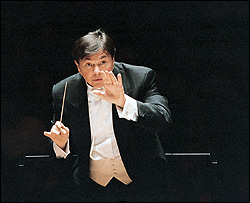Leonard Bernstein, really, was the only other conductor to pay as much attention to midcentury American music as Gerard Schwarz has done with the Seattle Symphony Orchestra. This is the music that first brought SSO to national attention: the work of America’s critically neglected symphonic wing—Hanson, Piston, Diamond, Hovhaness, and others—which Schwarz championed through recordings for the Delos label. Made in America, a festival of three full- and two chamber-orchestra concerts running Friday, May 6, to Thursday, May 19, at Benaroya Hall (206-215-4747) will celebrate this legacy. (American music since 1960 gets its turn next spring.)
It’ll be timely musical comfort food, considering the recent turmoil surrounding the May 2004 nonrenewal of then-concertmaster Ilkka Talvi’s contract. That incident precipitated a lawsuit from the players’ union; ongoing court arbitration; and the launching of a bitter, gossipy, irresistible blog by Talvi, studded with barely disguised attacks on Schwarz and his former colleagues (www.schmaltzuberalles.blogspot.com).
Don’t bother looking for black and white hats in this tangled affair. SSO, like any major classical-music institution, is notoriously secretive; conflicting rumors fly about sub-rosa political machinations and motives. But looking at the issue purely from the standpoint of the listener sitting in Benaroya Hall, it must be said that Talvi’s firing was justified.
It is not pleasant to state that someone deserves to lose his livelihood, and yet Talvi’s playing was a frequent disappointment, oddly unnuanced and charisma-free. Many in the orchestra, too, felt he was not the strong leader the first violins needed; there continues to be room for improvement in the generally capable section’s tonal richness and ensemble precision. Maria Larionoff is serving as interim concertmaster, moving up from the first violins’ second chair, and candidates for the post have been auditioning all season.
Yet Schwarz has been faulted for not acting sooner to improve the situation. Talvi says his firing came as a surprise; I’ve heard from SSO musicians that it surprised them, too. Even if the decision was warranted, it wasn’t handled well, considering Talvi and Schwarz’s long association. Unlike the other players, the concertmaster is appointed directly by the conductor, and the two arrived in Seattle from Los Angeles together two decades ago.
The most frequent musical complaint against Schwarz by orchestra members is that he’s a micromanager, insisting the players watch him closely even in the most familiar works. It’s true that Schwarz’s interpretations are most convincing in the lavishly detailed music of Wagner, Mahler, and Strauss. Less complex works might benefit from a looser hold on the reins, resulting in greater buoyancy and spontaneity. And Talvi, in his blog, makes the strong point that a rehearsal technique necessary for a semiprofessional orchestra in 1984 may not be the best way to handle a much stronger group two decades later. If we can credit Schwarz for bringing SSO to a higher level—and does anyone claim they played better before he arrived?—one could perhaps also fault him for not growing along with the ensemble, developing a better sense of when to back off and let the well-trained players do their thing.
On the other hand, the orchestral milieu necessitates what has to be one of the tensest employee-boss relationships in any profession: musicians who are trained, like all artists, to express individual aesthetic ideas and project personality, in a situation that almost never allows them to do so (unless you’re a first-chair player and get an occasional solo). Thus, orchestra leading, and especially orchestra building, invariably results in enemy making. Talvi himself says, “Orchestra musicians do not remain happy in their jobs for very long. This is especially true for string players, many of whom received training to become a soloist or at least an accomplished chamber musician.” It’s a mindset Schwarz, too, is familiar with—he began his musical career facing the podium, not on it, as a New York Philharmonic trumpeter.
This is not to say the grievances about Schwarz aren’t legitimate. It is to say that the players, given time, would generate a similar list of legitimate grievances about any conductor, be it Bernstein, Mahler, Beethoven, or God. (“His beat’s a little unclear in slow tempos, and he programs way too much Bach.”)
Suppose Schwarz did leave in 2008, when his current contract expires? Any change in that visible a post, any new approach, would create buzz among players and audiences alike, but I’d be skeptical that the honeymoon would last long, especially if the new music director had personnel changes of his or her own in mind. Schwarz’s devotion to the Made in America repertory also raises the question of how any theoretical successor might deal with contemporary music. His record is strong, if not exemplary; the one continuing source of frustration is that he remains so loyal to his New York connections when handing out commissions and performances at the expense of equally deserving composers from here or anywhere else. Here’s an early hope that next year’s spring festival will spotlight some of the more talked-about trends and composers of which SSO audiences usually get just tastes.
Whatever the SSO’s recent morale problems, you hear no evidence of them in concert—professional orchestral musicians pride themselves on not allowing backstage conflict to affect their onstage playing. In the 10 seasons I’ve been listening, their quality has remained consistent, tracing the same bell curve: at either end, some fair concerts and some spectacular ones; in the middle, enjoyable performances fully worthy of the orchestra’s status as one of the Northwest’s leading arts organizations.







